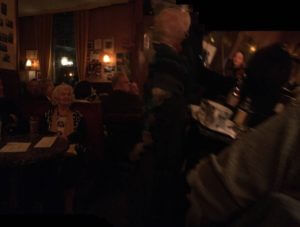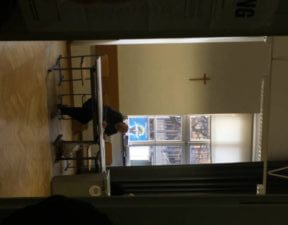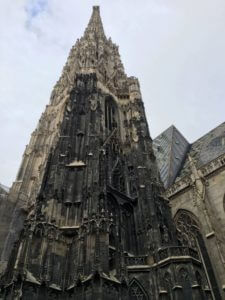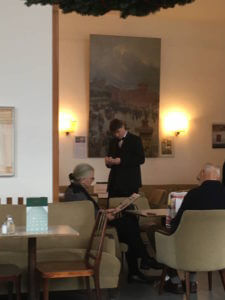This afternoon I’m leaving for London, and tomorrow I’ll be in Cambridge to watch Vladimir Bukovsky’s trial:
On Monday, 12 December 2016, Russian dissident and activist Vladimir Bukovsky will appear in Crown Court in Cambridge, UK, to face a jury trial for possession of child pornography on his home computer. The files were found by law enforcement officers, who received a tip shortly before Bukovsky was to testify in the inquiry into the murder of his close friend, former Russian secret service officer Alexander Litvinenko.Bukovsky was so hated by the FSB that he appeared on a leaked hit list of five people slated for assassination. Two of those five are now dead; another has been poisoned.Many believe Bukovsky was framed by Russian operatives who planted the offending files on his computer. But winning a Not Guilty verdict will be a challenge for his defence team. “For such a defence to work there will need to be more than the theoretical possibility – computer code showing the presence of a back door for remote access will be expected,” said Professor Peter Sommer, who has acted in a number of leading trials and investigations for both defence and prosecution.
Members of the press are allowed to tweet from the courtroom, although not to send sound files or photos. I’m not sure whether we’re allowed to communicate beyond Tweeting: I understand it’s at the judge’s discretion. I’m @claireberlinski on Twitter. Five days of court time have been reserved, but this doesn’t mean the trial will necessarily last five days.
Yesterday, The New York Times ran a long and prominent piece about Bukovsky and other opponents of Putin. It’s very worth reading:
This blurring of all boundaries between truth and falsehood in the service of operational needs has created a climate in Russia in which even the most serious and grotesque accusations, like those involving pedophilia, are simply a currency for settling scores. Mr. Bukovsky is far from the only one fending off such allegations.Yoann Barbereau, the French director of the Alliance Française in the Siberian city of Irkutsk, has been struggling since early last year to defend himself against charges that he posted child pornography on a website for Russian mothers. His lawyers, pointing to evidence that his computer was tampered with after his arrest, believe that the material was planted by local security service officers to punish Mr. Barbereau for an extramarital romance with a woman connected to a powerful local official. In September, after months under house arrest, Mr. Barbereau fled.Konstantin Rubakhin, an environmental activist who lives in exile in Lithuania, also got a visit from police officers looking for child pornography. Mr. Rubakhin speculated that that raid, in June last year, may have been part of an effort to derail his application for political asylum or his work for the EU-Russia Civil Society Forum, a research group that investigates corruption. In the end, the Lithuanian police dropped the case.
It’s pointless for me to speculate now, because in a few days I’ll know, for sure, what kind of evidence the Crown Prosecution Service has and what the jury concludes from it.
For those of you unfamiliar with Bukovsky’s writings, I suggest beginning with his introduction to the archives he collected. (Here’s a link to the archives themselves, which I highly recommend.)
… Looking at this line up of the Soviet “elite” I recalled an old joke which went around in the 1960s, that there are three qualities which cannot coexist biologically in one person: intellect, honesty, and party membership. One of the three was invariably excluded, so the result could be either a smart son of a bitch, or a stupid party hack. When the crisis of the regime came, that is exactly how they divided up: while the minority of clinical idiots continued to march, waving red banners, the cynical majority was quickly metamorphosing into “reformers”, “democrats”, “nationalists” and “free marketeers.” As far as they were concerned, the events in Russia did not constitute a revolution, nor liberation from totalitarianism, and certainly no sacrifice of their ideals, but simply an opportunity to advance their careers, jumping a couple of the old hierarchical steps in one go. How could CC secretary for propaganda from the Ukrainian satrapy, Kravchuk, pass up the chance to become President of a sovereign, nuclear state? Or economics editor of Pravda, Gaidar, the post of Prime Minister of Russia? And who cares whether this is now called democracy or socialism? For people like these, who were devoted only to their own privileges, “democracy” meant merely new opportunities for deceit, and the “market economy” meant only one thing — corruption. For that reason, they would stifle any independent initiative under the guise of stamping out corruption, while justifying their own corruption by “market forces.” Having seized power with a Lenin like grasp, they will never allow anything new to develop, apart from one thing: a new mafia in place of the old. …… Everything in my life proved to be a host of phantoms, nothing more. All that remained was an enormous cemetery, in which, as everyone knows, triumph belongs to the worms.There was also dismay, bitterness, a feeling of helplessness and of a wasted life:Why the hell could we not have brought this chapter of our history to a more worthy conclusion? What did we overlook? Where did we go wrong? Or maybe all our efforts were hopeless and senseless right from the start?




 oncrete number of refugees we can accept, feed, house, and educate until their country is safe or until they enter the workforce. That number is four-tenths of a percent of our population per annum. We will pay for this by making thesespecific cuts to our budget, and raising taxes by this amount. People who wish privately to sponsor more refugees are welcome to do so, so long as the refugees in question pass security and background checks, for which you as the sponsor must pay. Asylum applications must be processed at the border to ensure that no one enters the country on an illegitimate claim. Here is the plan. It is a specific plan.” It was the vagueness of the official response, I suspect, that made people lose their minds.
oncrete number of refugees we can accept, feed, house, and educate until their country is safe or until they enter the workforce. That number is four-tenths of a percent of our population per annum. We will pay for this by making thesespecific cuts to our budget, and raising taxes by this amount. People who wish privately to sponsor more refugees are welcome to do so, so long as the refugees in question pass security and background checks, for which you as the sponsor must pay. Asylum applications must be processed at the border to ensure that no one enters the country on an illegitimate claim. Here is the plan. It is a specific plan.” It was the vagueness of the official response, I suspect, that made people lose their minds.  There are no hordes; Austria has not been overrun.
There are no hordes; Austria has not been overrun.